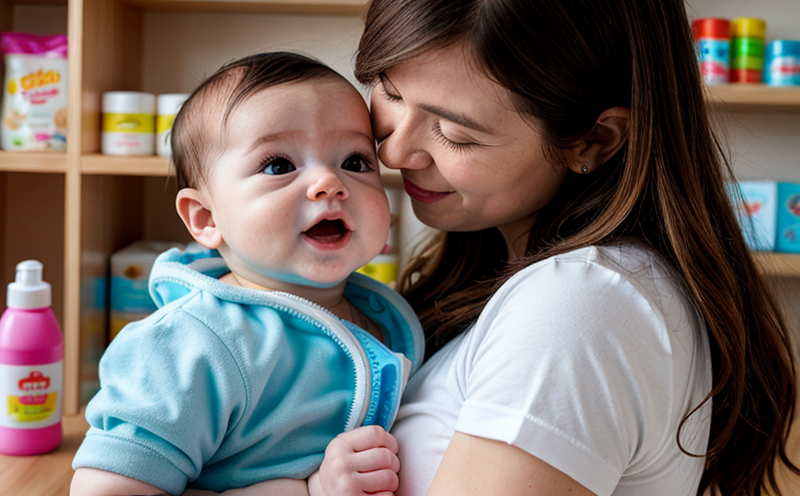Mold Resistance Testing in Baby Products
Mold resistance testing is a critical aspect of ensuring consumer safety, especially when it comes to baby products. Mold can pose significant health risks, particularly to infants and toddlers whose immune systems are still developing. The presence of mold in baby products such as toys, pacifiers, or bedding can lead to respiratory issues, skin irritations, and other health problems. As a leading laboratory specializing in consumer product safety testing, we offer comprehensive mold resistance testing services tailored specifically for the needs of this sensitive population.
Baby products are often made from materials that can retain moisture easily, creating an ideal environment for mold growth. Our experts understand these challenges and have developed robust testing protocols to evaluate the mold resistance of various baby product types. This includes not only traditional plastics and rubber but also newer materials like silicone and biodegradable polymers.
The first step in our testing process is selecting appropriate test samples based on their intended use and material composition. Once sampled, we replicate real-world conditions as closely as possible to ensure accurate results. For instance, we simulate humidity levels that might be encountered during storage or use, which can significantly influence mold growth rates.
Our state-of-the-art facilities house advanced equipment capable of detecting even trace amounts of mold spores and hyphae. Using techniques such as visual inspection under magnification, culture methods, and molecular analysis (PCR), we determine the level of mold contamination present in each tested item. The acceptance criteria for passing this test vary depending on the type of product being evaluated; however, generally speaking, products must show no visible signs of mold growth after exposure to controlled moisture conditions.
It's important to note that while our primary focus is on ensuring compliance with relevant international standards like ISO and ASTM, we also consider regional regulations when developing test plans. This ensures that all clients receive tests that meet both global best practices and local legal requirements.
The benefits of conducting mold resistance testing on baby products extend far beyond mere regulatory compliance. By identifying potential issues early in the development cycle or during production processes, manufacturers can address concerns proactively rather than reactively. Additionally, successful completion of this test demonstrates a commitment to product safety—a key factor in building consumer trust and loyalty.
- Enhanced reputation among parents seeking safe products for their children
- Avoidance of costly recalls or legal actions due to health complaints related to mold contamination
- Potential reduction in insurance premiums thanks to demonstrated adherence to strict quality control measures
- Increased market share as customers choose brands known for superior product safety practices
In conclusion, incorporating mold resistance testing into your baby products development and production processes is an essential step towards safeguarding young users' health and well-being. It allows manufacturers to meet stringent standards while enhancing their brand image in the eyes of consumers.
Applied Standards
In conducting mold resistance tests for baby products, we adhere closely to several internationally recognized standards that provide guidelines for assessing material properties under specific environmental conditions. These include:
- ISO 14683:2005 – This standard specifies procedures for determining the effect of humidity on polymeric materials used in medical devices, which can be applied analogously to baby products.
- ASTM D1979-02(2018) – Known as "Standard Test Method for Determining Resistance of Articles Containing Polyvinyl Chloride (PVC) to Fungi," this document provides clear instructions on how to assess the mold resistance properties of PVC-containing baby products.
- EN 13432:2000 – Relevant primarily for biodegradable plastics, this European standard can be useful if your product uses such materials. It ensures that the material decomposes under industrial composting conditions without producing harmful residues.
The choice of which standards to apply depends largely on the specific composition of the baby products being tested and any regional regulatory requirements applicable to them.
Why Choose This Test
Selecting us for your mold resistance testing needs offers numerous advantages that go beyond just meeting basic regulatory requirements. Here’s why you should consider partnering with our laboratory:
- Expertise and Experience: Our team comprises highly skilled professionals who stay abreast of the latest developments in both material science and microbiology, ensuring that your tests are conducted using cutting-edge methodologies.
- Comprehensive Coverage: We offer a full suite of services related to mold resistance testing, covering everything from initial consultation through final certification. This holistic approach allows us to provide tailored solutions suited to each client’s unique requirements.
- Rapid Turnaround Times: With efficient workflows and dedicated staff members focused solely on quality assurance tasks, we strive to deliver results quickly without compromising accuracy or reliability.
- Global Relevance: Our facilities comply with international standards recognized worldwide, ensuring that your products meet not only local but also global market demands.
- Cost Efficiency: By working closely with clients throughout the testing process, we aim to minimize unnecessary expenses and optimize resource utilization, ultimately delivering cost-effective solutions without sacrificing quality.
In summary, choosing our laboratory for mold resistance testing in baby products means accessing unparalleled expertise combined with innovative approaches aimed at enhancing product safety. Whether you’re a small startup or an established multinational corporation, we are committed to helping you achieve your goals while maintaining the highest standards of integrity and excellence.





